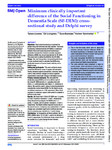Minimum clinically important difference of the Social Functioning in Dementia Scale (SF-DEM): cross-sectional study and Delphi survey
| dc.contributor.author | Levene, T | |
| dc.contributor.author | Livingston, G | |
| dc.contributor.author | Banerjee, Sube | |
| dc.contributor.author | Sommerlad, A | |
| dc.date.accessioned | 2022-04-22T11:20:30Z | |
| dc.date.available | 2022-04-22T11:20:30Z | |
| dc.date.issued | 2022-03-29 | |
| dc.identifier.issn | 2044-6055 | |
| dc.identifier.issn | 2044-6055 | |
| dc.identifier.other | e058252 | |
| dc.identifier.uri | http://hdl.handle.net/10026.1/19041 | |
| dc.description.abstract |
<jats:sec><jats:title>Objectives</jats:title><jats:p>Good social functioning is important for people living with dementia and their families. The Social Functioning in Dementia Scale (SF-DEM) is a valid and reliable instrument measuring social functioning in dementia. However the minimum clinically important difference (MCID) has not yet been derived for SF-DEM. This study aims to define the MCID for the SF-DEM.</jats:p></jats:sec><jats:sec><jats:title>Design</jats:title><jats:p>We used triangulation, incorporating data from a cross-sectional study to calculate the MCID using distribution-based and anchor-based methods, and a Delphi survey.</jats:p></jats:sec><jats:sec><jats:title>Setting and participants</jats:title><jats:p>The cross-sectional survey comprised 299 family carers of people with dementia. Twenty dementia experts (researchers, clinicians, family carers) rated whether changes on clinical vignettes represented a meaningful change in the Delphi survey.</jats:p></jats:sec><jats:sec><jats:title>Primary outcome measures</jats:title><jats:p>We calculated the distribution-based MCID as 0.5 of an SD for each of the three SF-DEM domains (1—spending time with others, 2—communicating with others, 3—sensitivity to others). We used the carers’ rating of social functioning to calculate the anchor-based MCID. For the Delphi survey, we defined consensus as ≥75% agreement. Where there was lack of consensus, experts were asked to complete a further survey round.</jats:p></jats:sec><jats:sec><jats:title>Results</jats:title><jats:p>We found that 0.5 SD of SF-DEM was 1.9 points, 2.2 and 1.4 points in domains 1, 2 and 3, respectively. Using the anchoring analysis, the MCIDs were 1.7 points, 1.7 points, and 0.9 points in domains 1, 2 and 3, respectively. The Delphi method required two rounds. In the second round, a consensus was reached that a 2-point change was considered significant in all three domains, but no consensus was reached on a 1-point change.</jats:p></jats:sec><jats:sec><jats:title>Conclusions</jats:title><jats:p>By triangulating all three methods, the SF-DEM’s MCIDs were 1.9, 2.0 and 1.4 points for domains 1, 2 and 3, respectively. For individuals, these values should be rounded to a 2-point change for each domain.</jats:p></jats:sec> | |
| dc.format.extent | e058252-e058252 | |
| dc.format.medium | Electronic | |
| dc.language | en | |
| dc.language.iso | eng | |
| dc.publisher | BMJ Publishing Group | |
| dc.subject | dementia | |
| dc.subject | delirium & cognitive disorders | |
| dc.subject | epidemiology | |
| dc.subject | old age psychiatry | |
| dc.title | Minimum clinically important difference of the Social Functioning in Dementia Scale (SF-DEM): cross-sectional study and Delphi survey | |
| dc.type | journal-article | |
| dc.type | Journal Article | |
| dc.type | Research Support, Non-U.S. Gov't | |
| plymouth.author-url | https://www.webofscience.com/api/gateway?GWVersion=2&SrcApp=PARTNER_APP&SrcAuth=LinksAMR&KeyUT=WOS:000777947200034&DestLinkType=FullRecord&DestApp=ALL_WOS&UsrCustomerID=11bb513d99f797142bcfeffcc58ea008 | |
| plymouth.issue | 3 | |
| plymouth.volume | 12 | |
| plymouth.publication-status | Published | |
| plymouth.journal | BMJ Open | |
| dc.identifier.doi | 10.1136/bmjopen-2021-058252 | |
| plymouth.organisational-group | /Plymouth | |
| plymouth.organisational-group | /Plymouth/Faculty of Health | |
| plymouth.organisational-group | /Plymouth/Faculty of Health/Peninsula Medical School | |
| plymouth.organisational-group | /Plymouth/Faculty of Health/Peninsula Medical School/PMS - Manual | |
| plymouth.organisational-group | /Plymouth/REF 2021 Researchers by UoA | |
| plymouth.organisational-group | /Plymouth/REF 2021 Researchers by UoA/UoA03 Allied Health Professions, Dentistry, Nursing and Pharmacy | |
| plymouth.organisational-group | /Plymouth/Users by role | |
| plymouth.organisational-group | /Plymouth/Users by role/Academics | |
| plymouth.organisational-group | /Plymouth/Users by role/Researchers in ResearchFish submission | |
| dc.publisher.place | England | |
| dcterms.dateAccepted | 2022-03-07 | |
| dc.rights.embargodate | 2022-4-23 | |
| dc.identifier.eissn | 2044-6055 | |
| dc.rights.embargoperiod | Not known | |
| rioxxterms.versionofrecord | 10.1136/bmjopen-2021-058252 | |
| rioxxterms.licenseref.uri | http://www.rioxx.net/licenses/all-rights-reserved | |
| rioxxterms.type | Journal Article/Review |


